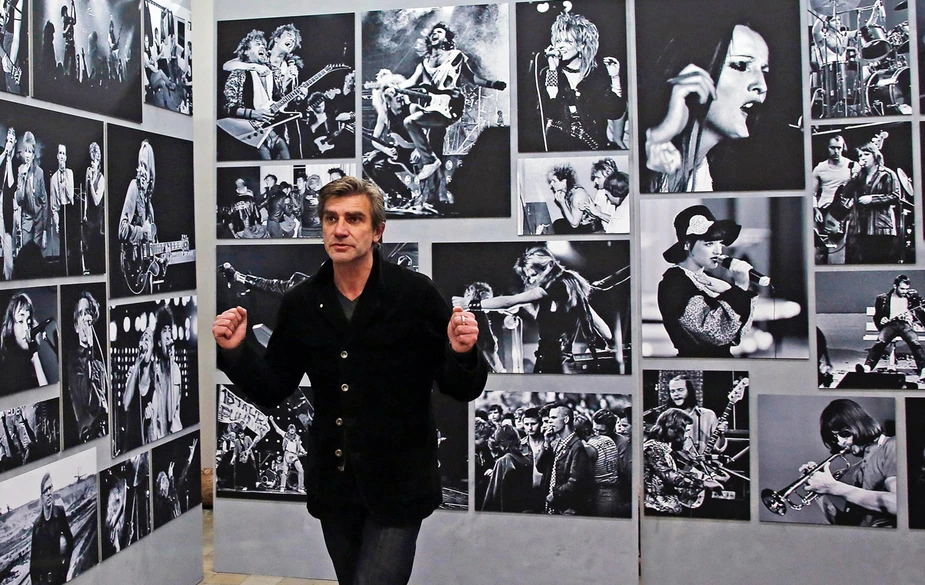Looking back
Director Lutz Pehnert on the female presenters of the GDR television and other stories from East Germany
These young women were the face of GDR television, they shaped TV events, and became “good friends” who were welcome in people’s living rooms. Some of them were nurses, teachers, or doctors, who worked TV presenters on the side. In his film “Die Schönen von Adlershof” (The Beauties of Adlershof), director and author Lutz Pehnert has many stories and anecdotes to tell from the sometimes long television careers of these ladies and lets us take a peek behind the scenes of GDR television. The Grimme Award winner has his own story of how he almost got into TV in Adlershof.
Pehnert is sitting on packed and ready suitcases. He is going on a filmic journey in two stages: first, to Klaipėda in Lithuania and then to the Russian city of St. Petersburg. Pehnert will document the first stage from Potsdam to the river Memel for the public broadcasting company Rundfunk Berlin-Brandenburg (rbb). He is currently recording a portrait documentary on the actress Katrin Sass. He says he enjoys telling stories about people. Recording such a portrait means spending ten days with one person, which is enough to get to know each other very well. Pehnert is intrigued by the challenge of “creating an image of this person”.
On the other hand, he is “highly embarrassed” when he thinks back to his own attempts at being a TV presenter for a short while. He presented and narrated the entertainment programme “Bridges and Mills of the GDR”. “A complete disaster for GDR television,” he laughs. Elke Bitterhoff, the main host of the GDR’s second television channel, suggested that he try. At the audition, he is advised to get speech training, but for some reason the recording still finds its way to the entertainment department, where Pehnert is hired. It was his first and last time in front of a camera. But he remained faithful to the medium as well as his first subject, television and the East.
He approaches his subject through people, like the female TV presenters from Adlershof or “The East Germans” in his 2014 documentary of the same name. Together with a directing collective, Pehnert looked at 25 years of non-GDR East Germany and paints a cinematic picture of 25 different biographies and attitudes. He did this with East-German artists in “Germany’s Artists”, the GDR as a maritime nation in “GDR Ahoi”, and with its economic system in “The Foreign Traders”. Pehnert looks back without being sentimental or ideological. The time of the GDR is over, says the author and director, “but it’s never a bad thing to confront yourself with your own past.”
Pehnert’s own past as a writer began as an editorial trainee for the newspaper “Junge Welt”. The father had helped make it happen for Pehnert, who, in his own words, was more of a novel writer and “too lazy to finish school”. Father Horst Pehnert was deputy minister of culture in the GDR and very influential, a fact “that never ceased to strike a nerve with the children of party officials.” However, Pehnert adds, “everybody at that newspaper was the son or daughter of someone influential.” His period of working for the arts and entertainment section of the paper collided with Berlin’s 750th birthday. The GDR leadership invited numerous international artists including singers, bands, theatre actors, and composers for the occasion. They should all be featured in the paper. Pehnert’s life then took place in hotel lobbies, where he interviewed Pina Bausch, Joe Cocker, Peter Maffay, and Heinz-Rudolf Kunze. Back then he was able to shed the “misguided reverence” for famous personalities, which still benefits his work when approaching and dealing with the protagonists of his productions today.
Somewhat fittingly, his first film is a portrait documentary of a typesetter’s son: the Dutch singer, clown, actor, and songwriter Herman van Veen. To write was Lutz Pehnert’s greatest freedom, but in 1995 he has had enough of the “Junge Welt”. “If I don’t get round to writing, what’s the use if I can write what I want,” he sums up that period of working on the team. Pehnert wanted to try something new. He chose film because “those who write can think in images. Television requires focusing one’s thoughts and reducing text to just a few seconds.”
Pehnert says he is “brutally pragmatic” when choosing his subject. He is usually approached by editors with ideas. “I love what I do, I earn a living with it.” He still has a few passion projects waiting for their turn: he would love to make a film about an orchestra, maybe for Beethoven’s 250th birthday. “An orchestra,” says Pehnert, “is like small society – there are different milieus and the conductor is the dictator.” Or to write a filmic story about a well-known photograph of the actors Jutta Hoffmann, Annekathrin Bürger, Angelika Domröse and Arno Fischer that appeared in the fashion magazine Sibylle in 1965.
By Rico Bigelmann for Adlershof Journal
